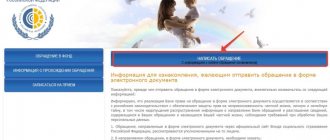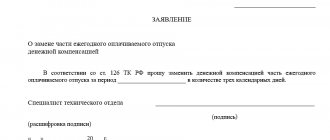Upon receiving a letter of resignation, the accountant's task is to make a final settlement with the employee on the last day of his work. But situations often arise when the employer provides the employee with leave in advance for unworked days or pays for the employee’s training. In addition, the employee may be liable for compensation for material damage. Does the employer have the right to withhold the listed costs when dismissing an employee? In what size is it acceptable to do this? What mistakes do employers most often make when withholding these funds? Read more about this in our article.
When is it possible and when is it not possible to withhold unworked vacation days from your salary?
The possibility of deducting overpaid vacation pay upon dismissal is stated in paragraph.
5 hours 2 tbsp. 137 Labor Code of the Russian Federation. According to this rule, if an employee is dismissed before the end of the working year for which he has already received annual paid leave, vacation pay for unworked vacation days may be withheld. So in most cases it is possible. But the legislator provides for a number of exceptions. Deductions are not made if the employee is dismissed on the following grounds:
- refusal to transfer to another job in accordance with a medical report issued in the manner established by federal laws and other regulatory legal acts of the Russian Federation, or the employer does not have the appropriate job (parts 3 and 4 of Article 73 of this Code) - clause 8 of Part 8. 1 tbsp. 77 Labor Code of the Russian Federation;
- liquidation of an organization or termination of the activities of an individual entrepreneur - clause 1, part 1, art. 81 Labor Code of the Russian Federation;
- reduction in the number or staff of employees of an organization, individual entrepreneur - clause 2, part 1, art. 81 Labor Code of the Russian Federation;
- change of owner of the organization’s property (in relation to the head of the organization, his deputies and the chief accountant) - clause 4, part 1, art. 81 Labor Code of the Russian Federation;
- conscription for military service or sending an employee to alternative civilian service - clause 1 of Art. 83 Labor Code of the Russian Federation;
- reinstatement of an employee who previously performed this work, by decision of the State Labor Inspectorate or the court - clause 2 of Art. 83 Labor Code of the Russian Federation;
- recognition of an employee as completely incapable of working in accordance with a medical certificate issued in the manner established by federal laws and other regulatory legal acts of the Russian Federation - clause 5 of Art. 83 Labor Code of the Russian Federation;
- death of an employee or employer-individual, as well as recognition by the court of an employee or employer-individual as dead or missing - clause 6 of Art. 83 Labor Code of the Russian Federation;
- the occurrence of emergency circumstances that impede the continuation of labor relations (military operations, catastrophe, natural disaster, major accident, epidemic, etc.), if this circumstance is recognized by a decision of the Government of the Russian Federation or a government body of the corresponding subject of the Russian Federation - clause 7 of Art. 83 Labor Code of the Russian Federation.
Editor's note:
Before making a final payment to an employee, you need to check whether he has unworked vacation days. If they exist, the employer has the right to make a deduction from his wages.
Refund employee training costs
The employer's expenses for training an employee in the event of his dismissal earlier than the agreed period are generally subject to reimbursement in proportion to the time not worked. The court may exempt an employee from compensation if it determines that he quit for health reasons. This reason is considered valid.
The employee, as directed by the employer, completed off-the-job training courses. After training, he was supposed to work for the company for at least three years, but he left of his own free will earlier and did not reimburse the costs of his training. The company filed a claim for reimbursement of expenses, but the court supported the employee. The judges found that he could not continue to work for a good reason - due to deteriorating health.
Thus, even if an agreement on compensation has been concluded with the employee, it will not always be possible to return the money.
Reimbursement Agreement
The employee is obliged to reimburse the training costs incurred by the employer by sending the employee to advanced training courses, internships or professional retraining courses. The amount of compensation is determined in proportion to the time actually not worked after completion of training, unless otherwise provided by the employment contract or training agreement (Article 249 of the Labor Code of the Russian Federation).
This means that the case of reimbursement by the employee of the employer’s training expenses must be documented.
The agreement can be drawn up in writing in any form, indicating the following information (Part 4 of Article 248 of the Labor Code of the Russian Federation):
- the employee’s intention to voluntarily compensate for the damage caused;
- term of service;
- the amount of the employee’s debt and the procedure for determining it;
- return procedure (at one time or in parts);
- return method (cash or non-cash);
- return period or payment schedule, etc.
If, despite the agreement, the employee refuses to voluntarily reimburse training costs in case of early dismissal, the conflict will have to be resolved in court (Part 2, 4 of Article 248 of the Labor Code of the Russian Federation). The chances of getting your money back if there is an agreement are quite high.
If the period of compulsory service at the time of dismissal has expired or it is not agreed upon in the employment contract or training agreement, the employee must not reimburse the employer’s training expenses (see Resolution of the Presidium of the Supreme Court of the Republic of Karelia dated December 29, 2010 in case No. 44g-64-2010) .
Good reasons
If the court considers the reasons why the employee refuses to reimburse training expenses to be valid, then the employer will not receive his money.
Thus, based on the Appeal Determination of the Supreme Court of the Republic of Karelia dated September 24, 2019 No. 33-3856/2019, such cases may include the dismissal of an employee for reasons of his own health. Despite the fact that the employee resigned of his own free will, the court found that the reason for such dismissal was the deterioration of his health, which occurred after completing his studies.
Other courts consider the need to care for a child under three years of age to be a valid reason (see, Appeal ruling of the Supreme Court of the Republic of Sakha (Yakutia) dated 08/27/2012 in case No. 33-2978/12), caring for a sick young child (Cassation ruling of the Khanty-Court). Mansi Autonomous Okrug - Ugra dated March 15, 2011 in case No. 33-1037/2011).
Valid reasons may also include those that interfere with the employee’s further work and did not occur through his fault. They are listed in the letter of the Ministry of Labor of the Russian Federation dated October 18, 2017 No. 14-2/B-935. These are the cases provided for by the Labor Code of the Russian Federation:
- lack of work if the employee needs to be transferred to another job in accordance with a medical report (clause 8, part 1, article 77 of the Labor Code of the Russian Federation);
- reduction of the number (staff) of the organization (clause 2, part 1, article 81 of the Labor Code of the Russian Federation);
- conscription for military service (clause 1, part 1, article 83 of the Labor Code of the Russian Federation).
What cases are not included in the agreement?
There are two cases that are not even worth mentioning in an early dismissal tuition reimbursement agreement.
The first case is when vocational training or additional vocational education is a condition for employees to perform certain types of activities and is directly provided for by federal law or other regulatory legal acts of the Russian Federation (Article 196 of the Labor Code of the Russian Federation). For example, advanced training of medical workers (clause 2, part 1, article 72, clause 8, part 1, article 79 of the Federal Law of November 21, 2011 No. 323-FZ “On the fundamentals of protecting the health of citizens in the Russian Federation”).
In addition, the employee is not obliged to return the amounts that the company spent on his trip to the place of study, namely:
- payment for travel there and back;
- expenses for renting residential premises;
- daily allowance.
This has already been an established position, confirmed by the majority of courts, including the earlier Ruling of the RF Armed Forces dated July 2, 2018 No. 69-KG18-7. It is based on the fact that travel allowances are a separate group of expenses for the employer and a special guarantee for the employee. In relation to training expenses, travel expenses are considered incidental.
How much can holiday pay paid in advance be withheld?
The Ministry of Labor of the Russian Federation explained the procedure for deducting overpaid vacation pay from an employee’s salary if he quits before the end of the working year for which he has already taken annual paid leave.
The Department noted that deductions of this kind are a right, not an obligation of the employer, and are at his discretion.
In accordance with Art. 138 of the Labor Code of the Russian Federation, the total amount of all deductions for each payment of wages cannot exceed 20 percent of the wages due to the employee.
Thus, if the amount of vacation pay does not exceed this limit, then in most cases it can be withheld.
Letter of the Ministry of Labor of the Russian Federation dated October 22, 2018 No. 14-1/OOG-8142
Limitations on the amount of withholding
According to Part 1 of Art. 138 of the Labor Code of the Russian Federation, the total amount of all deductions at the initiative of the employer for each salary payment cannot exceed 20%. This applies to deductions of unearned advances against salaries - only 20%.
If, simultaneously with deductions at the initiative of the employer, deductions are also made under executive documents, then in this case the total amount cannot exceed 50%.
But there are a number of situations when the restrictions of 20% and 50% do not apply, and the amount of deductions can increase to 70% - for example, when collecting alimony for minor children, when compensating for harm caused by an employee to the health of another person, when compensating for harm to persons those who suffered damage due to the death of the breadwinner, etc.
What payments cannot be withheld from vacation pay upon dismissal?
Part 4 of Article 138 of the Labor Code does not allow deductions from payments for which, in accordance with the Law of October 2, 2007 No. 229-FZ “On Enforcement Proceedings,” a penalty is not applied. According to paragraph 8 of Part 1 of Art. 101 of this law, the employer is prohibited from deducting from the following payments due to the employee:
- in compensation for damage;
- in connection with a business trip, transfer, employment or assignment to work in another area;
- due to wear and tear of a tool belonging to the employee;
- issued by the organization in connection with:
- with the birth of a child;
- with marriage registration;
- with the death of relatives.
How to write an appeal
Employees write consent to the employer in free form. The text must indicate the basis, amount and procedure for collection. Here's how to draw up an employee's application to write off a salary loan (in other cases we draw it up by analogy):
- Specify the addressee - full name. and the position of the manager, the name of the company.
- Enter information about the applicant - his full name, position.
- Title the document.
- Describe the reason and essence of the appeal - to whom and why to transfer funds.
- Specify the amount and procedure for collection.
- List payment details (if necessary) and supporting attachments (if any).
- Sign the application, put the date and full name. employee.
It will not be possible to recover overpaid vacation pay in court
The Department of the Ministry of Internal Affairs of the Amur Region filed a lawsuit against its former employee-psychologist for compensation of 38 thousand rubles in damages.
When leaving, the woman did not work 27 calendar days of the vacation she had already used. Due to the lack of funds due to payment from the psychologist upon dismissal, as well as her failure to pay the debt voluntarily, the GUMVD asked the court to recover the damage caused to him. And the court granted the request. The appeal upheld the decision. But the Supreme Court of the Russian Federation decided otherwise. According to the highest authority, the employer has no right to recover these amounts. The reason is that in the current legislation there is no basis for collecting debt in court from an employee who used vacation in advance if the employer, upon dismissal, was unable to deduct for unworked vacation days from the amounts due to the employee due to their insufficiency.
Editor's note:
Thus, if there is not enough vacation money paid upon dismissal to withhold the vacation money, you can offer the employee to pay off the debt voluntarily, since it will not be possible to collect the debt from him in court.
Determination of the Judicial Collegium for Civil Cases of the Supreme Court of the Russian Federation dated 02/05/2018 No. 59-КГ17-19
Conditions required for collection of funds
It is possible to recover funds spent on training if the following legal facts exist:
- Availability of grounds for referral to training.
- The acquisition of knowledge was carried out at the expense of the employer or his predecessor.
- After training, the time specified in the contract/agreement was not completed.
- Absence of valid reasons for dismissal (these may include: impossibility due to psychophysiological performance of a job function, violation of labor laws by the employer, relocation of a husband who is a military serviceman, etc.).
Respect is an evaluative category, since there is no clear closed list given. If there is disagreement, this issue can be resolved by the labor dispute commission or in court. It is worth paying attention to Art. 80 of the Labor Code of the Russian Federation, which reveals the circumstances that make it impossible to continue work.
In its recommendations, Rostrud focuses on indicating valid reasons for an agreement in order to avoid conflicts and misunderstandings in the future.
Good and bad reasons for early dismissal are determined by the employer
The possibility of recovering expenses for employee training is stipulated in Art. 249 of the Labor Code: “In case of dismissal without good reason before the expiration of the period stipulated by the employment contract or agreement on training at the expense of the employer, the employee is obliged to reimburse the costs incurred by the employer for his training, calculated in proportion to the time actually not worked after completion of training, unless otherwise not provided for in the employment contract or training agreement.”
Editor's note:
The legislator did not indicate which reasons can be considered valid.
Recommendations on this matter are given by Rostrud in letter dated October 18, 2013 No. 852-6-1. In order to avoid possible disputes, the department proposes that valid reasons for dismissal be written directly into the training agreement. Otherwise, collection can be made in accordance with Art. 248 of the Labor Code of the Russian Federation, that is, in an amount not exceeding the average monthly salary of an employee.
Therefore, in order to avoid disagreements and disputes with the employee, it is necessary to list which reasons can be considered valid.
How is the receipt of compensation for training costs reflected in the organization's accounting?
The only basis for deducting training costs from your salary is the existence of an apprenticeship contract, which is concluded in addition to the employment contract. If there is none, the employer does not have the right to reimburse expenses forcibly or at the request of the employee himself.
Despite the fact that Art. 137 of the Labor Code of the Russian Federation imposes certain restrictions on retention; in this situation, it is necessary to be guided by the norms of Art. 249 of the Labor Code of the Russian Federation, where compensation is calculated in proportion to the time worked.
When restrictions apply:
- When an advance is paid, if the employee does not work until the end of the month.
- To return amounts overpaid by mistake.
- Upon dismissal before the end of the year, if the employee has already used paid leave.
The employee did not receive a new specialty, but only improved his qualifications - expenses can be recovered
The LLC filed a lawsuit against a former employee for reimbursement of costs incurred for his training.
The conditions for compensation for training expenses were set out in an additional agreement to the employment contract. The employee resigned after failing to work the period specified in the agreement. On the same day, the company sent a notice to the former employee about the amount of expenses incurred for organizing and conducting his training, and about the need to compensate the employer for these expenses in the amount of 64 thousand rubles. The employee did not reimburse the expenses.
The courts of first instance and the appeal rejected the company, citing two arguments:
- no apprenticeship agreement was concluded between the parties to the case;
- After completing the training, the employee did not receive a new specialty that would allow him to perform a new type of professional activity, but only improved his qualifications within the framework of his existing profession. Therefore, costs incurred by the employer are not expenses that can be recovered from the employee.
However, the Supreme Court did not agree with its colleagues and stated:
- both an apprenticeship contract and other training agreements can be concluded between an employer and an employee, that is, an apprenticeship agreement is not the only type of training agreements concluded between an employee and an employer;
- The employee’s obligation to reimburse the employer for training costs does not depend on his obtaining a new specialty or qualification.
Determination of the Judicial Collegium for Civil Cases of the Supreme Court of the Russian Federation dated April 17, 2017 No. 16-KG17-3
Editor's note:
The Supreme Court came to two important conclusions. The first is that stipulating the conditions for training is allowed not only in the student’s contract, but also in the employment contract. Secondly, it is possible to recover training costs even if the employee has not received a new specialty.
What is a student agreement?
Before understanding the grounds for deductions from wages, you need to familiarize yourself with the concept of a “student agreement”. It means an agreement concluded between an employer and an employee looking for a job, or with an already employed employee, if he needs to receive education on the job or without interruption from work, but the specialization in study and place of work coincides (Article 198 of the Labor Code of the Russian Federation).
Here is an example of when a student agreement is required:
Head of the ambulance station Kovalev S.A. wants to hire paramedic N.A. Popov, who already has the appropriate education. He is required to take advanced training courses lasting 3 months. All this time he can work with partial interruption from work, because The “day/night/48” schedule allows you to simultaneously study and perform work functions.
The SSMP has an agreement with an educational medical institution, where doctors are sent for vocational training. Popov N.A. got a job, and in addition to the employment contract, an apprenticeship agreement was concluded, according to which he is obliged to undergo training and work for the employer for three years after that.
It will not be possible to recover expenses if the employer has violated the terms of the student agreement
An example where the court did not satisfy the employer’s demands to recover training costs from the employee.
An agreement was concluded between the employer - JSC Russian Railways, the electrician of the JSC and the university - Ural State University on the targeted training of a specialist in the specialty "Electric Transport". The society covered the costs of training. A separate provision of this agreement provided that the plaintiff (OJSC) agreed to accept the defendant (student) after graduating from an educational institution in his specialty for a position corresponding to his level of education, concluding an employment contract with him with the condition of working for at least five years. The employee successfully completed the training and received a diploma. Having not worked for the five years required by the contract, the employee resigned of his own free will. The costs of the plaintiff OJSC Russian Railways for training amounted to 116 thousand rubles, and the plaintiff spent 186 thousand rubles on the payment of a scholarship to the defendant during the training period. According to the terms of the contract, the period of mandatory work under the contract is 1,825 days, of which 723 days were not worked, based on which the amount of debt claimed by the plaintiff for collection amounted to 46 thousand rubles. However, the court refused to collect. The fact is that the employer violated the provisions of his own local act, because after completing the training he did not provide the employee with a job that corresponded to his new qualifications. In such a situation, it will not be possible to recover training costs.
Appeal ruling of the Sverdlovsk Regional Court dated May 18, 2018 No. 33-8861/2018
How is withholding reflected for tax purposes?
Enterprises using the general taxation system must contribute compensation to unrealized income if an employee quits early (Article 250 of the Tax Code of the Russian Federation). In this case, income is defined as the amount of compensation as of the actual date the quitter recognized his obligation to pay expenses to the employer. If the obligation to pay compensation is recognized through the court, the date on which the court decision enters into force is indicated.
If the cash method is used, the amount of unrealized income will be equal to the amount of deductions from wages, and the date is the day when the compensation was made.
Let's look at a detailed example:
In March, the LLC sent an employee for training, spending 23,600 rubles. An agreement was drawn up with her, under the terms of which she must work at the enterprise for at least 12 months. The employee completed the course on May 7, and in December she decided to quit by submitting an application. According to the terms of the contract, she is obliged to compensate 7,177 rubles.
The employee’s salary for December was 25,000 rubles, and the employer has the right to withhold no more than 25%, i.e. only 4,350 rubles, which were deducted upon dismissal. The remaining 2,827 rubles. she contributed to the organization's cash desk in January.
The cost of travel to the place of study cannot be recovered.
An employee of Surgutneftegas OJSC completed training in Moscow.
Having failed to fulfill the terms of the student agreement to work for three years after training, the woman wrote a letter of resignation. The employee did not object to the deduction of 356 thousand rubles from her salary, spent by the employer on training. But in addition to training costs, the company demanded compensation for travel expenses in the amount of 779 thousand rubles. The former employee refused to reimburse the funds voluntarily. The OJSC went to court. The city court did not support the society. The appellate instance ordered the recovery of the stated amount of travel allowances from the employee. But the Supreme Court overturned the decision. The reason is that travel expenses are an independent group of costs and relate to compensation provided to an employee at the expense of the employer in order to reimburse the costs associated with the performance of his labor and other duties, including responsibilities for vocational training or additional vocational education. Among the expenses that the employer is obliged to reimburse an employee when sending him on a business trip for vocational training or additional vocational education are the following expenses:
- for travel to and from the place of study;
- rental of residential premises;
- daily allowance.
Editor's note:
Previously, in judicial practice there was a different approach, for example, in the Appeal ruling of the Saratov Regional Court dated March 29, 2018 No. 33-1779/2018, the court indicated that the list of expenses for training an employee is not fixed by law. Therefore, the employer can include any expenses, including travel expenses.
The main thing is that they are related to training and supported by documents.
Reasons for referral to training
The basis for sending a person for training is:
- The contract, as a rule, is called a student agreement and is concluded with applicants before employment, as well as with persons entering an educational institution.
- An agreement is a document signed by both parties (employee and employer), which sets out the main provisions regarding training and work after completion of training.
Thus, speaking about the subject composition with which the contract is concluded, the following groups can be distinguished:
- Persons with whom the employer does not have a formalized employment relationship (applicants, students). In labor law, such relations are usually called “pre-labor”.
- Persons who have an employment relationship with an employer and are sent for training.
Expert commentary
Platonov Alexander
Lawyer
If an employee is sent to study, then another mandatory document related to the basis of the referral is an order to send him to study.
What needs to be done to recover damages
To compensate for material damage upon dismissal, you must:
- determine its size;
- establish the reasons for its occurrence.
Article 246 of the code obliges to determine the amount of damage on the day it was caused.
However, in cases where it is impossible to establish it, the employer has the right to calculate the amount of damage on the day it was discovered. This conclusion was made on the basis of Resolution of the Plenum of the Supreme Court of the Russian Federation dated November 16, 2006 No. 52. To determine the cause and amount of damage, the employer has the right (but is not obligated) to convene a commission with the involvement of specialists. But to establish the reasons, requesting an explanation from the employee who caused the damage is mandatory - Art. 247 Labor Code of the Russian Federation.
Ordinary workers are compensated for damage in the amount of average monthly earnings - Art. 241 Labor Code of the Russian Federation. Employees with full financial responsibility cover the damage in full - clause 1, part 1, art. 243 Labor Code of the Russian Federation. The list of positions of employees with whom an agreement on full financial liability can be concluded is given in Resolution of the Ministry of Labor of the Russian Federation dated December 31, 2002 No. 85. For example, such an agreement can be concluded:
- with the cashier;
- with courier;
- with the seller;
- with a storekeeper and other workers servicing material assets.
If the organization’s losses do not exceed the employee’s average monthly earnings, they can be recovered by paying him a salary upon dismissal.
This must be done within a month from the date its size is established by issuing an order - Art. 248 Labor Code of the Russian Federation. In this case, it is necessary to comply with the permitted amount of the penalty - no more than 20 percent of earnings. The employee may agree to compensate for the damage in whole or in part on a voluntary basis. Part 4 of Article 248 of the Code allows compensation for damage by installments. To do this, you must enter into a written compensation agreement with the employee.
If the employee does not compensate for the damage within a month or completely refuses obligations, the funds can only be recovered through the court - Part 2 of Art. 248 Labor Code of the Russian Federation.
According to Article 238 of the Labor Code of the Russian Federation, only direct actual damage can be recovered from an employee, which means a real decrease or deterioration of the employer’s existing property. Lost income (lost profits) cannot be recovered from the employee.
Accounting entries
To calculate the amount of deduction, you need to calculate how many calendar days the employee worked after training and the amount of money spent on it. Accounting entries are also prepared:
- Debit 73, Credit 91-1, which reflects the total debt of the employee.
- Debit 70, Credit 73, which shows compensation for training expenses.
- Debit 50, Credit 73 – indicates the entry of debt into the cash register.
It is important to remember that, in accordance with Part 1 of Art. 248 of the Labor Code of the Russian Federation, by order of the employer, compensation may be collected, the amount of which does not exceed the employee’s average monthly earnings. No more than 20% of the salary can be withheld one-time (Article 138 of the Labor Code of the Russian Federation).
“To calculate average earnings, it is necessary to take into account the last 12 calendar months of the employee’s labor activity, as well as the average monthly number of calendar days,” says Yu.P., head of the department of labor law at the Higher School of Economics. Orlovsky.
The procedure for calculating compensation is the same for organizations operating in all industries, incl. and budget.
What can be classified as direct actual damage?
Rostrud, answering the question about the financial liability of the organization’s employees, explained what can be classified as direct actual damage. The department provided specific examples. It can be:
- shortage of monetary or property assets:
- damage to materials and equipment;
- expenses for repairing damaged property;
- payments for forced absence or downtime;
- the amount of the fine paid.
Letter of Rostrud dated October 19, 2006 No. 1746-6-1
Obligation to pay
Important! According to labor law, an employee who has received education at the expense of the employer and has not worked for the established period is obliged to pay a sum of money in proportion to the time not worked.
Penalties cannot be established by contract or agreement. For example, in case of early dismissal, pay a penalty in the amount of 1,000,000 rubles. In judicial practice, there are often similar cases where the employer imposes a fine. However, in such situations, the courts side with the employee, recognizing this as an infringement of the employee’s rights, since the Labor Code of the Russian Federation does not provide for penalties, and these relations are regulated not by the Civil Code of the Russian Federation, but by labor law.
Is it possible to recover the full amount, regardless of the number of periods worked? This question often arises from an “offended” employer who wants to teach an ungrateful employee a lesson. Judicial practice, approved by the Supreme Court of the Russian Federation, has today developed in such a way that these actions are recognized as infringing on the rights of workers, and therefore violate labor legislation.
It is not uncommon for an employee who was sent to study to be expelled for poor academic performance. The employer has a natural question whether it is possible to recover the money spent from such an employee. In this matter, the court is on the side of the employer. Thus, the amount actually spent on training will be collected from this person.
For example, if a person was expelled at the end of the 1st year, then in fact he must pay not for all years of study, but for the 2 semesters that he completed.
In addition, it is necessary to pay attention to those expenses that are not included in the amount to be recovered.
Thus, in a review of the practice of the Armed Forces of the Russian Federation (“Review of the practice of courts considering cases of material liability of an employee”, approved by the Presidium of the Armed Forces of the Russian Federation on December 05, 2018) came to the conclusion that the funds spent on compensation for travel to the place of training, daily allowances, and maintaining average earnings did not subject to recovery, since these expenses would have been incurred if the employee did not study.
The provisions of the Civil Code are not applicable to compensation for damage from a former employee.
The LLC accused the resigned employee, who held the position of accountant, of embezzling funds from the cash register and entered into an agreement with her to reimburse the funds.
The woman returned only part of the stolen goods. The company went to court. She demanded to collect the remaining debt and a penalty for late payment. In response, the former accountant put forward a counterclaim to invalidate the agreement, since she had to compensate for the damage according to the rules of the Labor Code of the Russian Federation. The first and second instances supported the employer. The former employee recognized the legality of the agreement, since she began to voluntarily repay the debt. The norms of the Labor Code of the Russian Federation were not required to be applied, since at the time the agreement was concluded, the employment relationship had already been terminated.
But the Supreme Court did not support the approach of its colleagues. The provisions of the Civil Code are not suitable for holding a former employee financially liable and concluding an agreement with her on compensation for damages. This had to be done according to the rules of labor legislation. Thus, the employer was obliged:
- carry out verification;
- take a written explanation from the employee;
- determine the amount of damage;
- find out the reasons for its occurrence;
- determine the accountant's guilt.
The courts did not find out whether the procedure was carried out correctly, so the RF Supreme Court sent the case for review.
Determination of the Judicial Collegium for Civil Cases of the Supreme Court of the Russian Federation dated 06/03/2019 No. 9-КГ19-5
Procedure for reimbursement of costs to an enterprise
Before deducting tuition fees from an employee upon dismissal, the amount of the amount is determined.
Based on the provisions of Art. 249 of the Labor Code - calculation is made in proportion to the time not worked - or at clauses of the contract, agreement, if other conditions are specified there. After this, the employee is notified by mail and handing over the documents personally against a signature. If he agrees, the citizen submits an application to the accounting department to deduct the required amount from the compensation due to him, if it is enough to cover the charges. If you do not receive a response from the employee within a month and the repayable amount threshold is exceeded (more than the average monthly salary of a specialist), the employer goes to court. The claim for reimbursement includes all types of training costs: the cost of education, travel to and from the place where it was received, and a stipend from the employer. To recover amounts accrued for withholding:
- the manager issues a free-form order no later than one month after the amount of the tuition debt becomes known;
- accounting deducts certain expenses from the final calculation, subject to the condition that the withheld amount should not exceed the employee’s average monthly earnings, and a one-time withdrawal should not exceed 20% of income;
- the company goes to court on the basis of Art. 248 of the Labor Code, if the measures taken did not bring results.
If an employee refuses to reimburse the costs of his education, it is recommended to make a final settlement with the citizen and, after issuing him a work book and money, apply to the court with a claim to recover the costs of his education. This will be better than a situation where the retention is declared illegal. You will need to participate in two meetings: first as a defendant at the employee’s request, then to collect the debt as a plaintiff.







